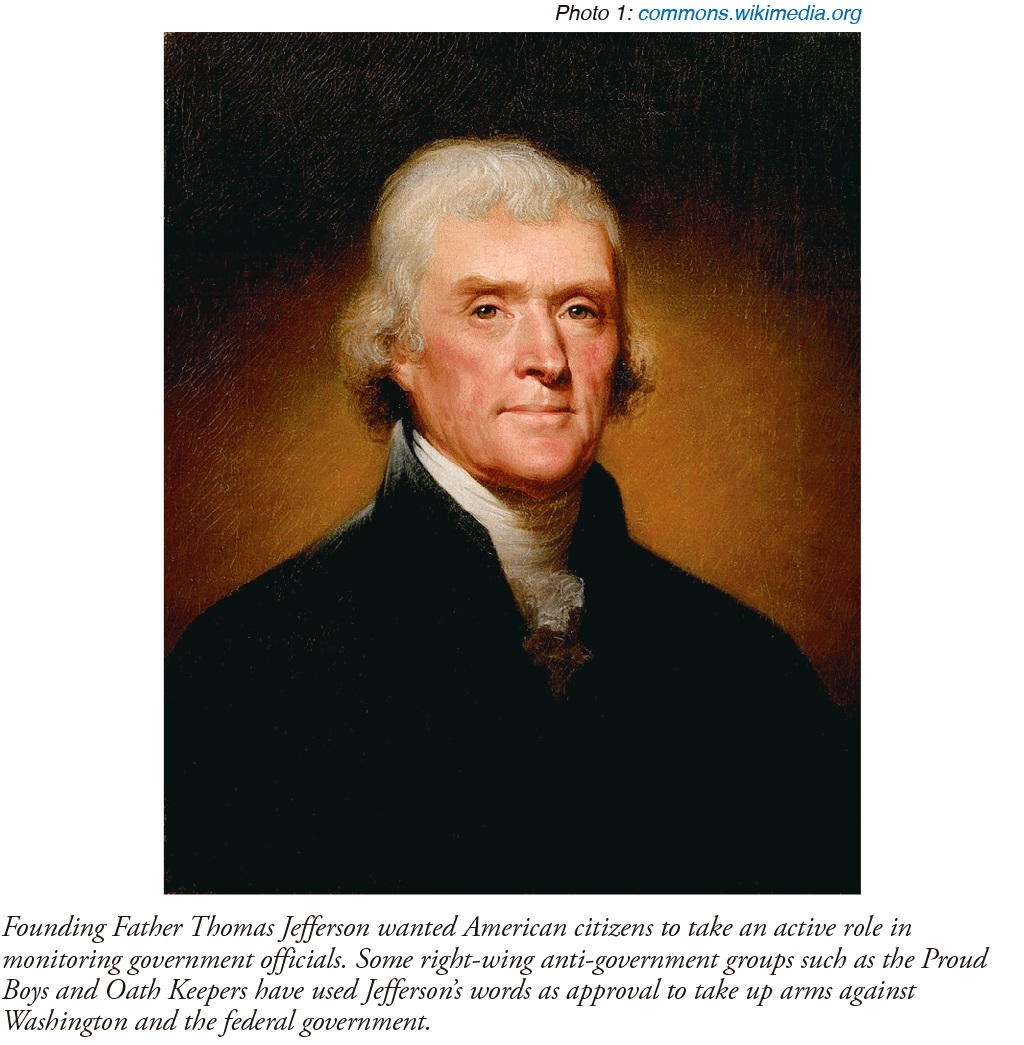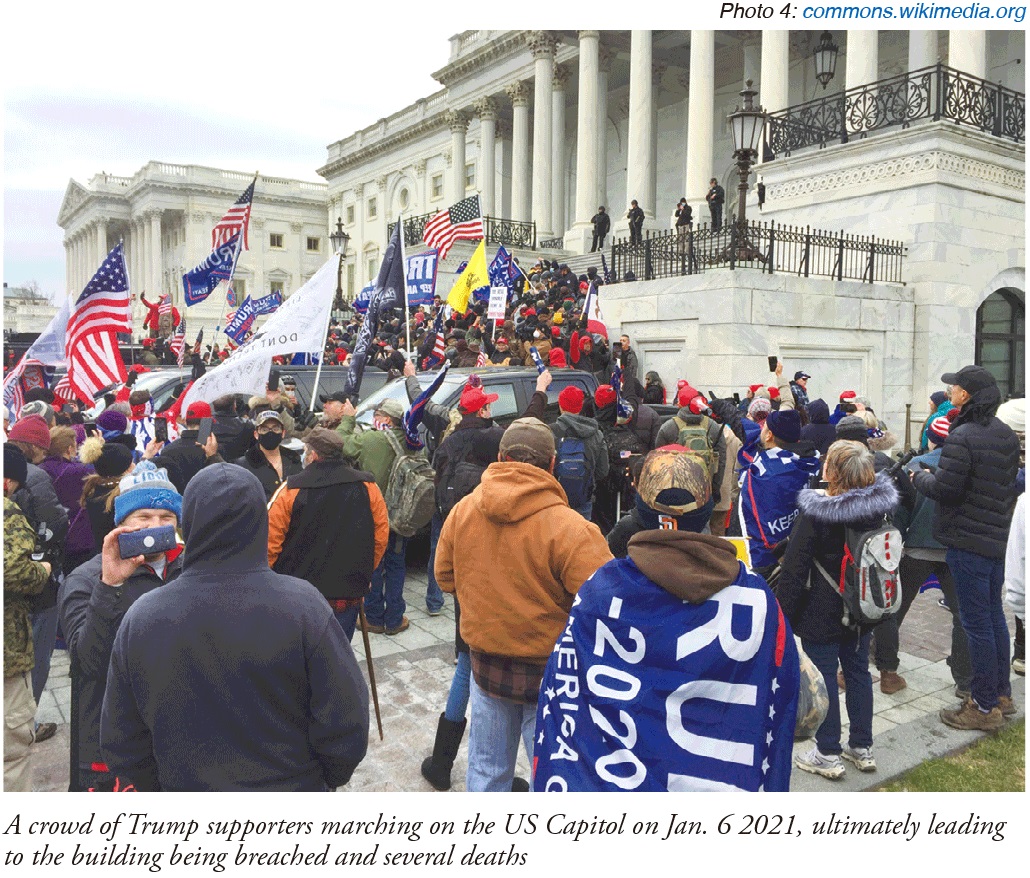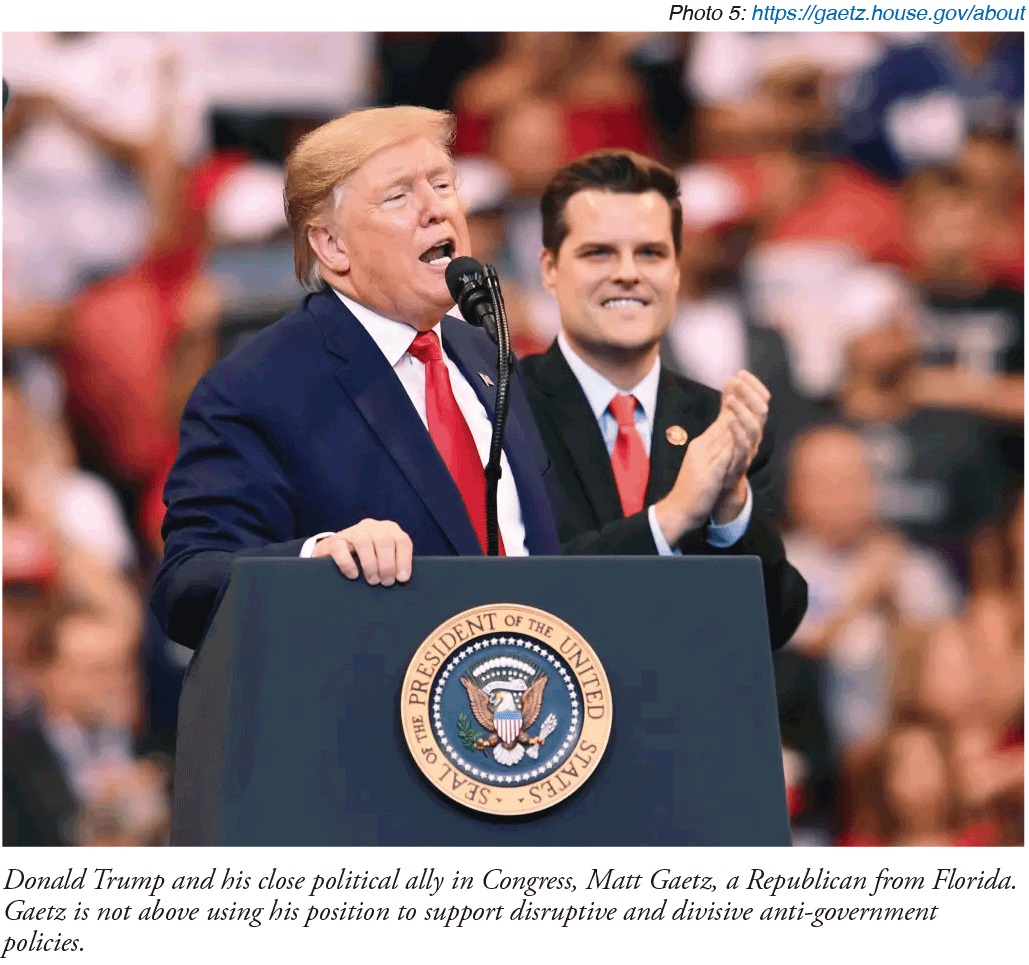HOME > Japan SPOTLIGHT > Article
Trump & the Unpredictable 2024 Election--Can an "Anti-Government" Candidate Win Again?
By Constantine A. Pagedas
Throughout its 248-year history, the United States has had to contend with anti-government movements as a constant feature of American political life. Even before the American Revolution, the rebellion by the Thirteen Colonies against the British crown, whether it was the actions of a colonial mob protesting against the British Parliament's right to tax the colonies that led to the Boston Massacre in 1770, or the Sons of Liberty disguised as Native Americans who destroyed a shipment of tea in what became known as the Boston Tea Party of 1773, Americans have often been driven to act--sometimes violently--against what they have perceived as government encroachment on their lives, liberties, and the pursuit of happiness.

Today, as the US heads into the 2024 presidential election, a confused and unsettling picture has emerged--especially with respect to the two most likely candidates. On the one hand, former President Donald Trump is leading the Republican field of candidates in most polls by an average of 44 points without having participated in any of the party's debates. And on the campaign trail, he is playing up his anti-government credentials, highlighting that he plans to rid the US government of "the deep state" and exact political revenge against those who have brought criminal charges against him. On the other hand, current President Joe Biden, who defeated Trump in 2020, has a job approval rating that is languishing at around 41 percent. This is largely due to an ongoing higher-than-normal inflation rate, an uncertain economy as new global economic challenges arise, and a sense in both Republican and Democratic circles that the president's age may be finally catching up with him.
As such, the 2024 presidential election is shaping up to be one of the most uncertain and unpredictable in modern US history. Indeed, this election could see Biden win re-election and continue as the oldest president in US history, Trump return to the presidency as the first officeholder to have been charged in four federal criminal indictments, or a relatively unknown candidate break through and offer an alternative approach to the current political inertia in Washington. Independent, third-party candidates such as Robert F. Kennedy, Jr. have also thrown their hats into the ring and could act as a spoiler for one of the major party candidates. In any event, many people are now wondering whether an "anti-government" candidate such as Trump could again become the Republican presidential candidate in 2024 and eventually return to the White House.
The Constant Anti-Government Feature of American Politics
"What country before ever existed a century and half without a rebellion? And what country can preserve its liberties if their rulers are not warned from time to time that their people preserve the spirit of resistance? Let them take arms ... The tree of liberty must be refreshed from time to time with the blood of patriots and tyrants. It is its natural manure." So wrote one of the most famous founding fathers of the US, Thomas Jefferson, who in 1787 endorsed the idea that resistance--if not outright rebellion--was an appropriate action for citizenry to air their political grievances against tyrannical government authority (Photo 1). Tyranny, or cruel and oppressive rule, however, is highly subjective. Indeed, Jefferson's words have been adopted, some might say manipulated, by far-right anti-government groups to justify their extreme rhetoric and violent behavior to curb Washington's political overreach of state and local communities. Indeed, the way in which the US Constitution is written sets up an ongoing political tension in the US about rights and responsibilities of the federal government in relation to the individual states. This division of power that is enshrined in the Constitution has led to bitter and sometimes deadly political conflicts, whether it was the Confederate states arguing their right to maintain the institution of slavery in the mid-19th century which ultimately led to the US Civil War, or the strong isolationism of Middle America that delayed the US entry into both world wars in the 20th century.

That is not to say that the US has never seen periods of significant federal government expansion. Indeed, the pendulum has swung the other way, usually when the country has faced a political crisis requiring strong and centralized government, whether it was Franklin D. Roosevelt's "New Deal" to mitigate the effects of the Great Depression of the 1930s, Lyndon Johnson's "Great Society" to address the social unrest of the 1960s, or George W. Bush's response to the Sept. 11, 2001 terrorist attacks.
In some cases, the expansion of federal government powers was approved with relatively little political opposition either from Congress or the American public. This was the case in the aftermath of 9/11 most notably with the creation of the Department of Homeland Security, currently the third-largest department in the US government after the Departments of Defense and Veterans Affairs with over 250,000 employees.

In other cases, however, presidential actions to expand the reach of government either garnered an immediate anti-government response, or a longer-term anti-government movement fueled by an ambitious political outsider whose rhetoric blamed Washington for the ills Americans seemed to be suffering. This has been an especially effective argument made by Republicans to paint the Democrats over the past half-century as the party of big government and out of control spending. The former actor and Republican President Ronald Reagan, for example, perfectly captured the anti-government mood in the post-Great Society American electorate (Photo 2). In his first inaugural address on Jan. 20, 1981, he famously observed that "Government is not the solution to our problem, government is the problem. From time to time we've been tempted to believe that society has become too complex to be managed by self-rule, that government by an elite group is superior to government for, by, and of the people." Alluding to Abraham Lincoln's Gettysburg Address, Reagan provided his anti-government message in a palatable way, adding that "If no one among us is capable of governing himself, then who among us has the capacity to govern someone else?"
The Trump Effect
The efforts of former President Barack Obama's administration to address the 2008 global financial crisis called for the federal government to invest in the country's aging infrastructure as well as to revamp the US healthcare system. As a result, the Tea Party movement within the Republican Party formed in 2009 to resist the perception of Washington's growing power and the "Democratic Socialism" agenda under Obama. Focused on the core principles of lowering taxes, reducing the national debt and the federal budget deficit, as well as reducing the size of the federal government, dozens of Tea Party Republicans were swept to power in Congress in the 2010 midterm elections. Although the Republicans were able to cut some federal government spending through the Budget Control Act and a process known as sequestration, these actions did not realize all the major cuts the members of the Tea Party had originally envisioned. Moreover, Republicans voted no less than 64 times over the next several years to repeal one of Obama's signature pieces of legislation--the Affordable Care Act, otherwise known as Obamacare--believed by some extreme Tea Party members of Congress to put the US firmly on the road to a government-run, socialized healthcare system (Photo 3).

Enter Trump, who promised to succeed where the Tea Party had failed. Tapping into the anti-government mood created by the Tea Party's efforts against the Obama administration, the New York City property magnate and former reality television star of The Apprentice cashed in on his name recognition and ran for office as a Republican with an anti-government message. His expressed intent was to replace the Washington political establishment by "draining the swamp" under the slogan to "Make America Great Again". Running against Hillary Clinton, someone who epitomized the political establishment, Trump promised throughout the election campaign that he would undo much of the federal government expansion of his predecessors. And during his term in office, to some extent he did.
In one of his first actions as president, on Jan. 30, 2017, Trump signed Executive Order 13771 on "Reducing Regulation and Controlling Regulatory Costs". This Executive Order required any department or agency of the US government considering a new regulation to propose at least two regulations to be revoked. Trump's deregulatory, pro-business approach was welcomed by his fellow Republicans in Congress, from cutting back Environmental Protection Agency regulations on US industry designed to protect the environment and slow down climate change to the passing of the Tax Cuts and Jobs Act of 2017, a bill which reduced tax rates especially on wealthy businesses and individuals, significantly cutting federal government revenue. Importantly, the law also eliminated the federal penalty associated with the Affordable Care Act's individual mandate--thus removing a critical Obama era requirement on businesses and individuals to ensure they are covered by some form of basic health insurance.
Despite his repeated campaign promise that he could eliminate the national debt in eight years--a key Republican Tea Party objective--it should be noted that as president Trump approved of significant increases in government spending, mostly for favored departments and programs such as the Department of Defense. According to Brian Riedl of the conservative Manhattan Institute think-tank, "President Trump signed legislation and approved executive actions costing $7.8 trillion--compared to $5.0 trillion for President Obama and $6.9 trillion for President Bush. In addition, President Trump enacted these costs in just a single four-year presidential term compared to his predecessors' eight years in the Oval Office." Granted, much of the spending during the Trump administration ($3.9 billion) was in response to the global pandemic and was based on bipartisan legislation signed by Trump to float the US economy. Combined with the 2017 tax cuts, however, again according to Reidl, Trump era spending saw the US national debt soar from $14 trillion in nominal dollars to $21 trillion by the end of his term, while the US debt-to-GDP ratio hit a post-World War II high above 100%.
Jan. 6 & the Split of the Republican Party
Overall, Republicans in Congress lauded Trump's deregulatory approach to limit the size of the federal government and allow US industry to operate in a reduced regulatory environment, but they also turned a blind eye towards massive government spending programs and the increase in the national debt during the Trump era. Most importantly, and what Republicans had not bargained for, was the president's encouragement of far-right anti-government extremists on Jan. 6, 2021 to keep him in power after he had lost the 2020 election to Biden (Photo 4).

It may be an understatement to say that Trump was one of the most controversial presidents in US history. Whether it was his "Muslim ban", his criticisms of military veterans, or his support for white nationalists following the "Unite the Right" rally in Charlottesville, Virginia, Trump courted anti-government militia groups and brought them into the political mainstream to support his personal causes. During his time in office, most Republicans came to the president's defense. Indeed, they were prepared to make this Faustian bargain so long as Trump could deliver on nominating conservative judges to the US federal court system, as well as continue to support deregulation and limiting the power of the federal government.
This changed, however, on Jan. 6. Having lost the 2020 election to Biden, the Trump team made baseless claims that there had been widespread voter fraud and challenged the election results in a bid to remain in power. Trump and his associates filed 62 lawsuits contesting election processes, vote counting, and the vote certification process in nine states. These were in turn rejected by at least 86 judges at both the state and federal level, including by federal judges appointed by Trump himself, many of whom found the suits "without merit" due to a lack of evidence. Desperate to remain in power, Trump pulled out all the stops on Jan. 6 at the "Save America" rally on the Washington Ellipse organized by the far-right wing anti-government militia groups, the Proud Boys and the Oath Keepers.
Just as Congress was preparing to certify the 2020 election results, Trump repeated his false claims that the election had been "stolen by emboldened radical-left Democrats" and encouraged the rally goers to march on the Capitol building to make their voices heard. At that crucial moment, he told them "If you don't fight like hell, you're not going to have a country anymore." According to reports, more than 2,000 protesters-turned-rioters, some of whom were armed, entered the Capitol building and vandalized offices and meeting chambers. The lawmakers quickly went into recess and were evacuated to a secure location while the mob went on its rampage. In total, five people died during the event, while many were injured, including 138 police officers who had responded to the attack. Later in the day, once order was restored, and as is outlined in the Constitution, Vice President Mike Pence certified the Electoral College results and thus Biden's election victory. That said, even after that day's fateful and horrific events, eight Republican Senators and 139 Republican Representatives still objected to certifying the 2020 election.
And therein lies the challenge the Republican Party currently finds itself. Trump's controversial presidency and actions at the end of his term to remain in power has done what no Democrat has been able to do over the past 50 years. In short, Trump has effectively divided the Republican Party against itself, turning it into a party characterized by dysfunction and in some cases venal subservience to the former president by certain Republican members of Congress.
A Year of Republican Dysfunction
On Nov. 8, 2022, the US held its mid-term elections representing former President Trump's first political test as leader of the Republican Party after his departure from office. Normally, the opposite party of the president is expected to make significant gains against the president's party in his first term. Indeed throughout 2022, Biden had historically low approval ratings (in the low-to-mid 40% range), while the top voting issues--high inflation and high energy prices--were expected to bring Republican voters out to the polls against the Democrats.
This did not happen. The "red wave" that many had predicted became in fact a "red ripple". Republicans who had been expected to sweep into a majority in both the Senate and the House instead lost a seat in the Senate, allowing the Democrats to retain a majority, and only saw a 10-seat gain in the House, bringing the Republicans to a narrow 222-213 seat majority. A deeper dive into the results, however, showed that Trump-backed Republican candidates underperformed and thus minimized the Democratic losses many had been expecting. Traditional Republicans (i.e., those not openly endorsed by Trump) appear to have performed as expected, easily beating their Democratic opponents. Given the extremely narrow Republican majority in the House, there was little room for division, setting up a politically challenging 2023 for the party.
The first warning sign came in January, when it took 15 votes to elect Congressman Kevin McCarthy of California as the House Speaker--a result which had not occurred since the contentious pre-Civil War era. A small core group of right-wing, anti-establishment, Trump-backed Republicans from the House Freedom Caucus led by Matt Gaetz of Florida prevented McCarthy from obtaining the Speaker's gavel without significant concessions, to include a rule allowing a single House member to introduce a vote to remove the Speaker (Photo 5). May and early June was a particularly tense period within the Republican Party when McCarthy reached an agreement with the Biden administration to raise the US debt ceiling, whereas members of the House Freedom Caucus had pushed McCarthy to hold out for deeper cuts in federal spending.

Things were brought to a head at the end of September when the annual appropriations bills to fund the federal government for fiscal year 2024 came up for a vote in the House. With the vocal encouragement of Trump, 21 right-wing Republicans voted against the Republican bill Speaker McCarthy had introduced because there were not steep enough spending cuts. Notably, McCarthy tried to appeal to the far-right House members when he did not include further US military funding for Ukraine in its war against Russia, a key priority of Trump and his "America First" followers. But this was not enough. With a government shutdown looming, McCarthy had little choice but to work with Democrats and passed a Continuing Resolution, a temporary stopgap measure to keep the government operating at FY 2023 levels through Nov. 17. With that, Gaetz filed a motion calling for McCarthy's removal. On Oct. 3, eight right-wing Republicans joined with the Democrats and voted to remove McCarthy as Speaker of the House.

In a preview of Republican Party dysfunction heading into the 2024 elections, a permanent Speaker to replace McCarthy could not win a majority in the House until Oct. 25, after four excruciating rounds of voting openly demonstrated the deep divisions in the party. While all House business had to be put on hold until a new Speaker could be elected, there was obvious difficulty within the party in uniting behind a candidate who could appeal to both the Trump-allied anti-government extremists and the party moderates. In the end, the GOP settled on Mike Johnson, a little-known, religiously conservative Congressman from Louisiana who had voted to overturn the 2020 presidential election results following the events of Jan. 6--thus meeting with Trump's strong approval (Photo 6). Johnson, however, like McCarthy before him, engineered a new Continuing Resolution on Nov. 14 to fund the federal government through early 2024 with overwhelming Democratic support and divided Republican support. Whether this leads to another internal challenge to Republican political cohesion in the US Congress in 2024 remains to be seen.
Contenders & Pretenders
Overall, the major Republican challengers standing in the way of Trump winning the Republican nomination for president fall into three categories. There are the "Trump Critics", such as New Jersey Governor Chris Christie, who has been portraying himself as a traditional, moderate Republican aiming to lead the party back to its fiscally responsible, socially conservative, and free market-oriented roots. During the Republican debates and on the campaign trail, Christie has consistently raised Trump's legal problems and moral fitness for office which he claims should disqualify him from receiving the Republican nomination and from assuming the duties and responsibilities of the presidency.
The second group of Republican candidates could be labeled as "Trump Imitators". Perhaps the most vocal group, these candidates, which include Florida Governor Ron DeSantis and biotech entrepreneur Vivek Ramaswamy, have been aping the former president and similarly claiming to be anti-government Washington outsiders. As such, they have taken controversial and extreme positions (as Trump has) that are outside the traditional Republican mainstream when it comes to foreign policy (by claiming they would terminate US military aid to Ukraine and reestablish good relations with Russia), domestic policy (by focusing on nativist issues such as illegal immigration and the protection of the US southern border), climate change policy (by denying the existence of human-induced climate change and emphasizing the further development of fossil fuels to bring down overall fuel costs), and social policies (by railing against academic teachings focused on systemic racism in the US and the inequalities of American society).
The final group could be considered as the "Party Loyalists", represented by former South Carolina Governor and former United Nations ambassador during the Trump administration Nikki Haley--a candidate who previously served and worked closely with Trump--but who has also highlighted her service to the country, her loyalty to the Constitution, and her fealty to the Republican Party above her service to the former president himself (Photo 7). Haley is vying to replace Trump but is trying to do so in a manner that does not alienate current Trump supporters. As such, she is carefully laying out a subtle case that she is prepared to adopt much of Trump's "America First" mantra, but offer herself as a better alternative to Trump whose presidency and post-presidency continues to divide Republicans and most Americans.

From the vantage point of early 2024, it is possible that Trump could maintain his current lead in the polls and once again win the Republican nomination as well as the White House. Dominating the Republican polling in 2023 and maintaining a slight lead in the polls in a potential head-to-head matchup with Biden, however, is no guarantee that Trump will be able to secure the nomination or win the general election come November. Indeed, in 2023, most US voters have not begun to look carefully at the candidates.
Trump's true viability as a candidate will be tested beginning on Jan. 15, 2024 with the Iowa caucus and then on Jan. 23 with the New Hampshire primary, states where at the end of 2023 Trump's poll numbers appear to be softening while Haley appears to be making inroads among Republican voters. As of Nov. 17, according to polling by Real Clear Politics, on average Trump leads Haley by 47% to 14.3% in Iowa and by 45.7% to 18.7% in New Hampshire. However, Trump's lead is expected to shrink as more Republican candidates drop out of the race.
Can an "Anti-Government" Candidate Win in 2024?
Trump has not won an election since 2016 and his support for obscure, "anti-government" candidates who are simply loyal to him personally has been a mixed blessing at best for the Republican Party. The large Republican gains that had been expected in the 2022 mid-terms were mitigated because of Trump's influence on the party. What has become clear over the past several election cycles is that Americans, whether they support small, limited government or prefer larger, expanded government, nevertheless still want a federal government that works and can function. The Trump-inspired anti-government actions on Jan. 6, and more recently Gaetz's removal of Speaker McCarthy which brought the House of Representatives to a standstill, will likely be remembered by voters come November 2024.
Moreover, despite strong polling in 2023, Trump also has many legal challenges before him in 2024, namely the 91 felony charges that span four criminal indictments. At the moment, he faces federal and state criminal charges associated with his role in the Jan. 6 attack on the US Capitol and his alleged mishandling of classified US documents after he left the White House, as well as charges against him by the state of New York for allegedly falsifying records related to hush money payments to adult film actress Stormy Daniels and by the state of Georgia for allegedly conspiring to overturn the election results there and in other key states in order to retain the presidency. Although Trump's poll numbers among Republicans are currently strong despite the criminal charges, polls also show that his support drops significantly if he is convicted on any of the charges against him. In any event, Trump will be tested to be both on the campaign trail and in court defending himself, thus opening the likelihood Republicans may begin to focus on other candidate options.
Nikki Haley, who has already had several strong debate performances and who also matches up better against Biden than Trump, appears poised to be the most likely Republican candidate to overtake Trump for the nomination. Being a middle-aged woman of Indian-American descent with significant government experience, Haley is also well positioned to win in the general election on some of the core issues Democrats have recently dominated--namely abortion and women's reproductive health. To that end, Haley can attract suburban women who have been leaving the Republican Party since Trump's appointment of three very conservative Supreme Court Justices leading to the overturning of Roe v. Wade guaranteeing a woman's right to an abortion in the US. The results of the 2023 off-year elections should be another warning sign for Republicans supporting Trump. Democratic Governor Andy Beshear handily won re-election against the Trump-backed state Attorney General Daniel Cameron in Kentucky, a traditionally Republican state, while Ohio became the seventh US state to pass a ballot measure in favor of abortion rights.
In the end, Republicans only have themselves to blame for embracing Trump and his "anti-government" rhetoric and thus marginalizing the party to one that is constantly held hostage to the boss and his close political allies. While Americans may be generally frustrated with the perception of federal government incompetence and do not appear enamored with Biden, they appear even less enthusiastic about another four years of an "anti-government" candidate such as Trump--despite what the polls currently say. This may be especially true as much of the American electorate seems to have learned over the past eight years that when Trump goes on an "anti-government" rallying cry and criticizes the federal government, he is only criticizing it because it does not serve him or his personal agenda. If the polls do remain accurate, Trump is elected in 2024, and he carries out his threat to "root out" government officials who have legally and legitimately opposed him, labelling them as "communists, Marxists, fascists and the radical-left thugs that live like vermin in our country that lie and steal and cheat on elections", then it may be time for mainstream Americans to revisit Jefferson's call to resist government tyrants. Until then, America and the world will likely be forced to witness one of the most bizarre and unpredictable elections in US history.
Japan SPOTLIGHT January/February 2024 Issue (Published on January 10, 2024)
(2024/02/05)
Constantine A. Pagedas
Constantine A. Pagedas is executive vice president and COO at International Technology and Trade Associates, Inc. (ITTA), a consulting company based in Washington, DC.

























